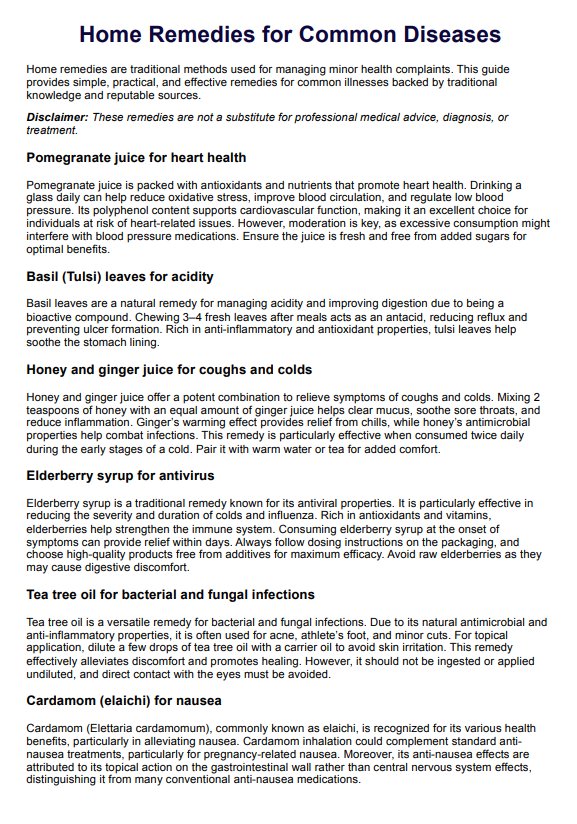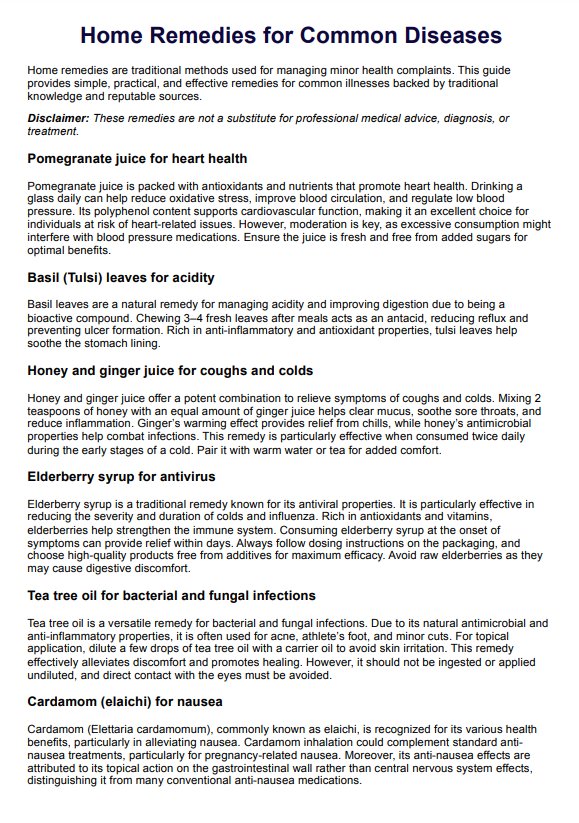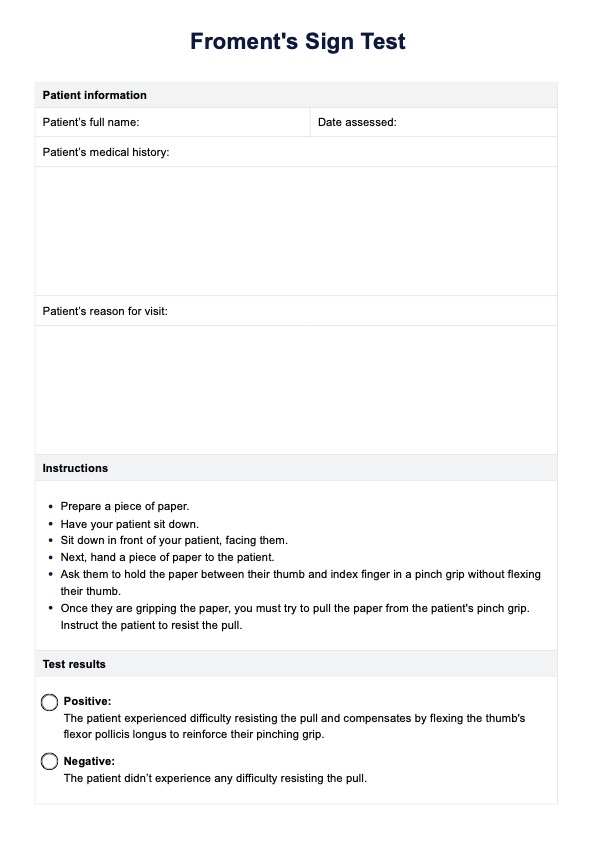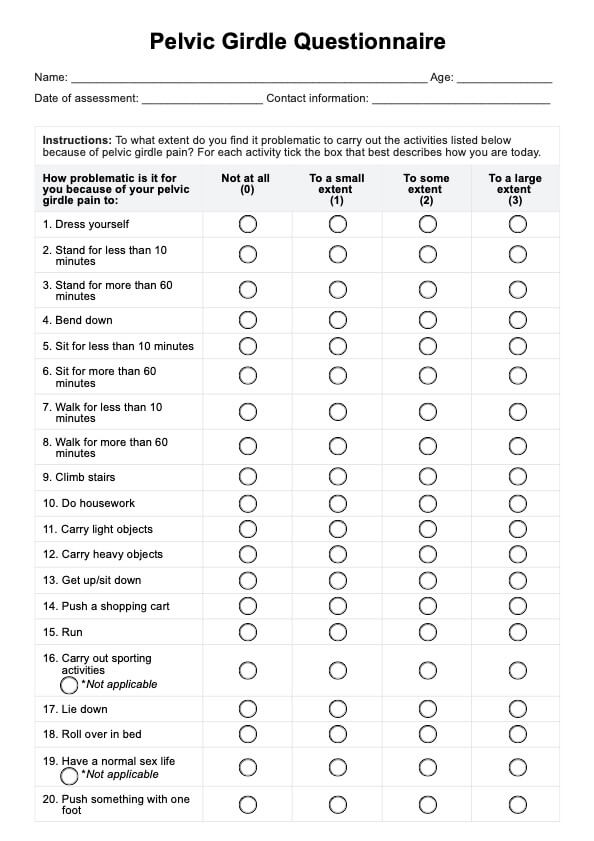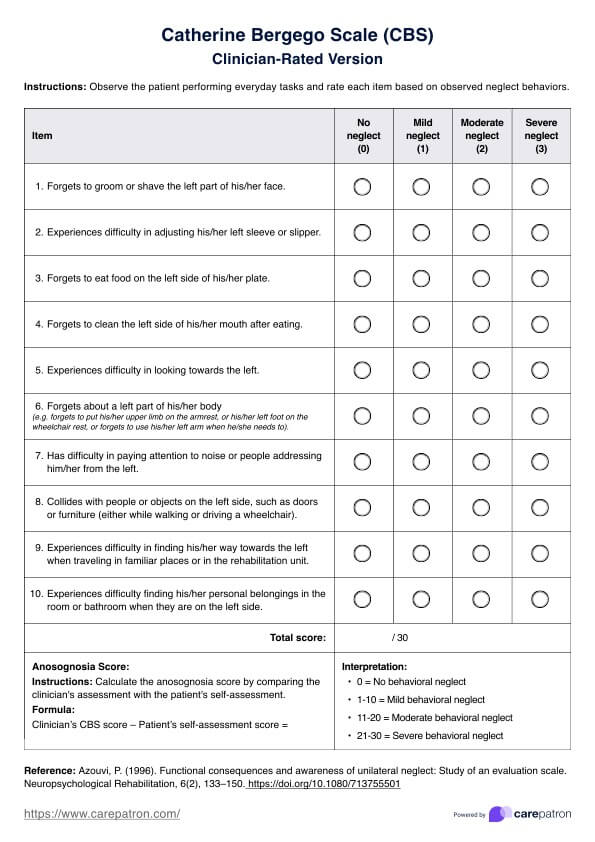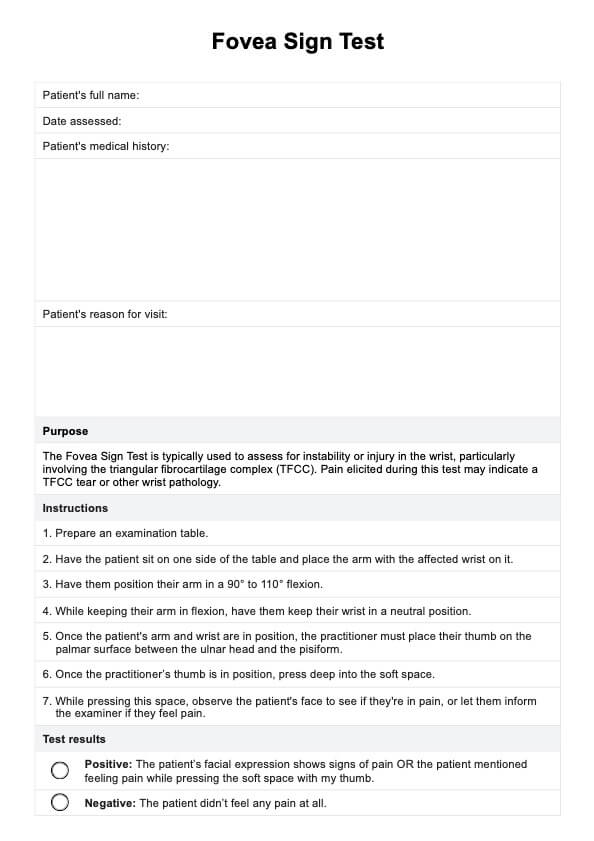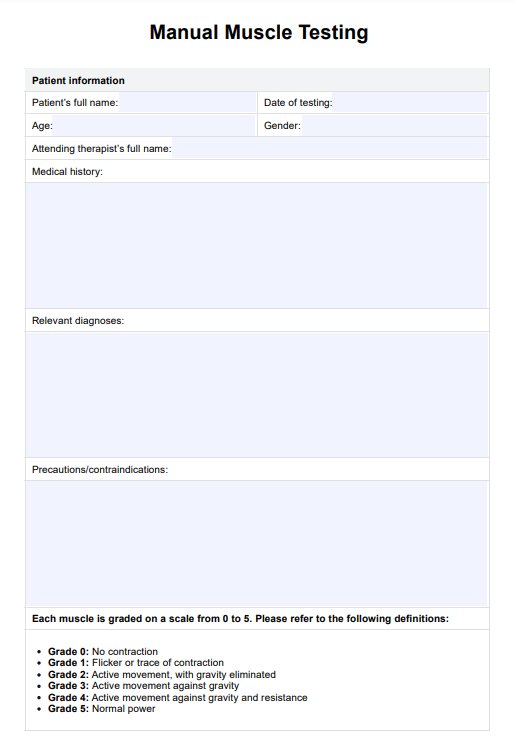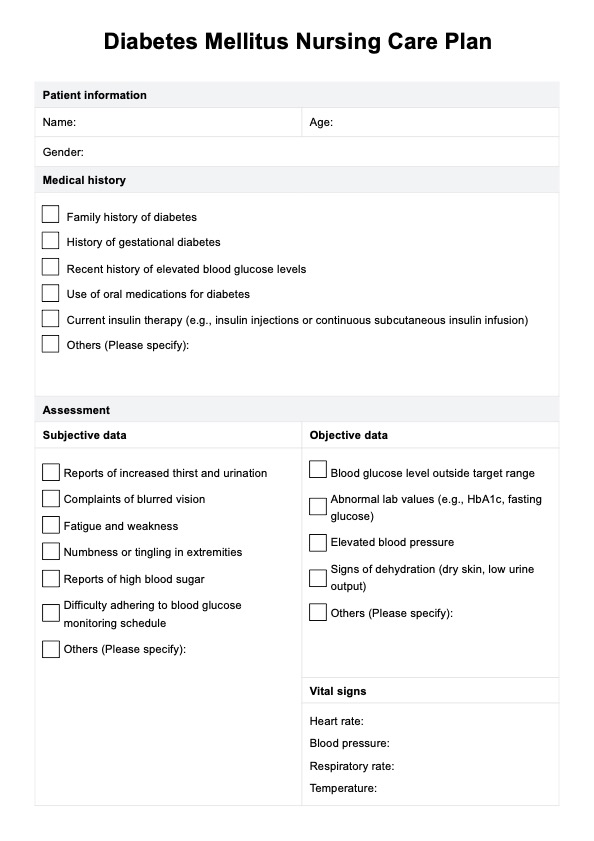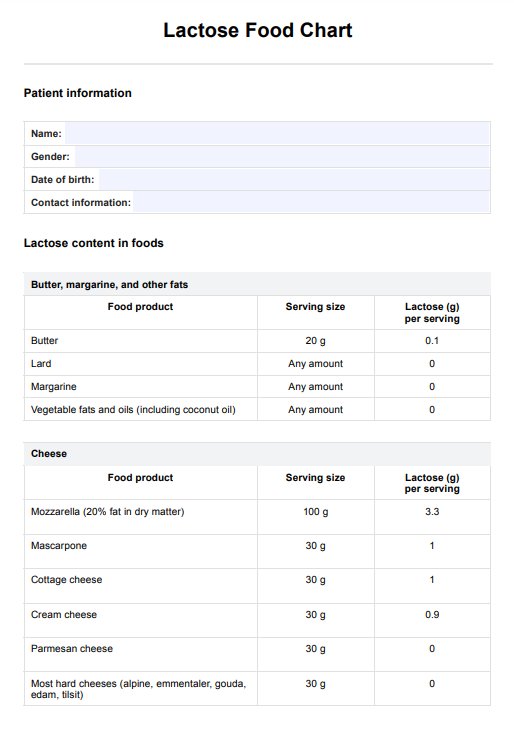Home Remedies for Common Diseases PDF
Discover effective home remedies for common diseases with Carepatron's free PDF download. Learn how to treat various ailments naturally.


What are home remedies?
Home remedies are simple, non-prescription treatments that alleviate symptoms of minor health complaints. Often derived from herbal remedies, they are used for conditions like upset stomach, sore throats, cold symptoms, and other common ailments. These remedies fall under the broader category of complementary and alternative medicine, including practices and treatments used alongside or in place of traditional prescription medications.
Home remedies are usually made from natural ingredients, such as plants, herbs, and essential oils, and aim to relieve symptoms without needing pharmaceutical intervention. For example, herbal teas such as chamomile or ginger can soothe an upset stomach, while honey and lemon can ease a sore throat. Essential oils, like peppermint or eucalyptus, are often applied topically or inhaled to relieve conditions like joint pain or muscle aches.
While home remedies can be effective for managing cold symptoms and minor discomfort, they should be used with caution. Many of these remedies are supported by anecdotal evidence and limited scientific research (Parisius et al., 2014). However, certain herbal remedies and natural treatments have gained recognition in clinical settings for their potential to support the immune system or provide symptomatic relief.
Healthcare practitioners may recommend home remedies as part of a holistic treatment approach, but it is important to differentiate between effective natural remedies and those that lack scientific validation. Although some remedies can provide relief for minor health complaints, they should not replace medical treatments for serious conditions. Proper guidance on the safe use of natural remedies ensures they can complement conventional healthcare.
Home Remedies for Common Diseases PDF Template
Home Remedies for Common Diseases PDF Example
Examples of Home Remedies for Common Diseases
Home remedies have been used for generations to manage common diseases and symptoms. Below are examples of natural remedies that healthcare practitioners may recommend for supporting patients with minor ailments. These remedies can complement traditional treatments and help manage conditions effectively.
Pomegranate juice for heart health
Pomegranate juice is rich in antioxidants, particularly polyphenols, which help reduce oxidative stress and support heart health. Drinking a glass of fresh pomegranate juice daily may improve blood circulation, lower blood pressure, and support cardiovascular function (Basu & Penugonda, 2009). It can be a useful natural remedy for patients at risk of heart disease, as it has been shown to enhance the function of blood vessels and reduce cholesterol levels. However, it should be consumed in moderation to avoid interactions with blood pressure medications.
Basil (Tulsi) leaves or garlic cloves for acidity
Basil (Tulsi) leaves and garlic cloves may be effective natural remedies for managing acidity (Romano et al., 2022). Due to their anti-inflammatory properties, Basil leaves can help soothe the stomach lining and reduce acid reflux. Chewing 3–4 fresh basil leaves after meals may provide relief from heartburn and prevent ulcer formation. Garlic, on the other hand, is known for its antimicrobial properties and can aid in digestion. Both remedies may complement conventional treatments for acidity and gastroesophageal reflux disease (GERD).
Honey and ginger juice or tea for coughs and colds
Honey and ginger juice or tea are well-known remedies for relieving cough and colds. Ginger has natural anti-inflammatory and antimicrobial properties that help reduce sore throat symptoms and clear mucus, while honey’s soothing qualities ease irritation. Mixing honey with ginger juice can help alleviate congestion and promote healing (Jaybhaye et al., 2022). For best results, you may suggest using this remedy twice daily, particularly in the early stages of a cold, to boost comfort and immunity.
Elderberry syrup for antivirus
Elderberry syrup is often used for its antiviral properties, particularly during cold and flu seasons (Wieland, 2021). Rich in antioxidants, elderberries strengthen the immune system and have been shown to reduce the severity and duration of common cold and influenza symptoms. Healthcare professionals may recommend elderberry syrup at the onset of cold symptoms to help alleviate discomfort and reduce recovery time. It is important to follow dosing instructions and avoid raw elderberries, which can cause digestive distress.
Tea tree oil for bacterial and fungus infections
Tea tree oil is a powerful natural remedy for bacterial and fungus infections due to its antimicrobial properties. It can be applied topically, diluted with a carrier oil, to treat conditions such as acne, athlete's foot, and minor cuts. Tea tree oil helps disinfect and promote healing by combating bacteria and fungi (Ardiana, 2021). It should be used cautiously to avoid skin irritation and should never be ingested or applied undiluted. It is also crucial to avoid eye contact when using this remedy.
Cardamom (elaichi) for nausea
Cardamom (elaichi) is a traditional remedy for nausea and digestive discomfort (Khatiban, 2022). Known for its anti-nausea properties, cardamom can help soothe the stomach and relieve symptoms of motion sickness or pregnancy-related nausea. Inhaling the scent of cardamom or consuming it as part of herbal teas can provide relief by calming the digestive system.
Peppermint oil for irritable bowel syndrome (IBS)
Peppermint oil is widely promoted as an effective remedy for irritable bowel syndrome (IBS) and other digestive issues (National Center for Complementary and Integrative Health, 2020). The oil is commonly used in aromatherapy and topical applications to alleviate abdominal discomfort, bloating, and cramping symptoms. It can also be beneficial for treating headaches, muscle aches, and joint pain and reducing stress, making it a versatile natural remedy.
Apple cider vinegar as a natural weight loss aid
Apple cider vinegar (ACV) has been studied for its potential role in weight management, particularly in overweight or obese individuals (Khezri et al., 2018). A clinical trial demonstrated that when combined with a restricted calorie diet (RCD), ACV significantly reduced body weight, BMI, hip circumference, and appetite while improving lipid profiles by lowering triglycerides and total cholesterol and increasing HDL cholesterol.
Note that these remedies are intended to support overall well-being and should not replace prescribed medical treatments or professional healthcare advice. Their effectiveness may vary based on individual health conditions, and it is essential to use them responsibly. As a healthcare professional, you are responsible for evaluating the suitability of these remedies for individual patients, ensuring they are used safely, and providing guidance on their proper use in conjunction with evidence-based medical treatments.
How does our Home Remedies for Common Diseases template work?
Carepatron's Home Remedies for Common Diseases template provides a structured approach for healthcare professionals to educate patients on natural remedies for common health issues. Following a simple step-by-step process, practitioners can customize, explain, and guide patients through effective home remedies tailored to their needs.
Step 1: Access and use the handout
To begin, healthcare professionals can click "Use template" within the Carepatron app. This will open the Home Remedies for Common Diseases resource, where they can easily fill out or customize the handout based on the patient's condition before printing or sharing digitally. For a PDF copy, just click "Download."
Step 2: Introduce the handout to the patient
Once the handout is ready, introduce it to the patient during the consultation. Explain that the document contains helpful natural remedies for managing minor health complaints. This allows patients to make informed decisions about complementary and alternative medicine options that support their health.
Step 3: Explain the handout content
Go through the handout sections with the patient, explaining the remedies for specific conditions. Emphasize the benefits, correct usage, and possible precautions for each remedy. Ensuring the patient understands how each natural remedy works is essential for promoting safe and effective usage in managing symptoms such as nausea or sore throats.
Step 4: Provide further patient education and next steps
After discussing the handout, provide additional education on when to seek medical attention if symptoms persist or worsen. Explain the importance of using home remedies as complementary tools alongside prescribed treatments, such as prescription medications, and clarify any questions the patient may have before concluding the session.
References
Ardiana, D. (2021). Role of tea tree oil as a skin antimicrobial: A literature study. Medical and Health Science Journal, 5(1), 26–33. https://doi.org/10.33086/mhsj.v5i1.1921
Basu, A., & Penugonda, K. (2009). Pomegranate juice: A heart-healthy fruit juice. Nutrition Reviews, 67(1), 49–56. https://doi.org/10.1111/j.1753-4887.2008.00133.x
Jaybhaye, D. L., Chandra, S., Johar, S., & Nagre, A. S. (2022). Effect of honey and ginger mixture on productive cough in pediatric patients. International Journal of Basic & Clinical Pharmacology, 11(3), 237–241. https://doi.org/10.18203/2319-2003.ijbcp20221038
Khatiban, M., Mirzaie, M., Fazeli, A., Tapak, L., & Khalili, Z. (2022). Effect of cardamom inhalation therapy on intra- and postoperative nausea and vomiting of mothers undergoing spinal anesthesia for elective cesarean section. Journal of PeriAnesthesia Nursing, 37(4), 452–457. https://doi.org/10.1016/j.jopan.2021.09.008
Khezri, S. S., Saidpour, A., Hosseinzadeh, N., & Amiri, Z. (2018). Beneficial effects of apple cider vinegar on weight management, visceral adiposity index, and lipid profile in overweight or obese subjects receiving a restricted calorie diet: A randomized clinical trial. Journal of Functional Foods, 43, 95–102. https://doi.org/10.1016/j.jff.2018.02.003
National Center for Complementary and Integrative Health. (2020, October). Peppermint oil. NCCIH. https://www.nccih.nih.gov/health/peppermint-oil
Parisius, L. M., Stock-Schröer, B., Berger, S., Hermann, K., & Joos, S. (2014). Use of home remedies: A cross-sectional survey of patients in Germany. BMC Family Practice, 15(116). https://doi.org/10.1186/1471-2296-15-116
Romano, R., De Luca, L., Aiello, A., Pagano, R., Di Pierro, P., Pizzolongo, F., & Masi, P. (2022). Basil (Ocimum basilicum L.) leaves are a source of bioactive compounds. Foods, 11(20), Article 3212. https://doi.org/10.3390/foods11203212
Wieland, L. S., Piechotta, V., Feinberg, T., Ludeman, E., Hutton, B., Kanji, S., Seely, D., & Garritty, C. (2021). Elderberry for prevention and treatment of viral respiratory illnesses: A systematic review. BMC Complementary Medicine and Therapies, 21(21), Article 83. https://doi.org/10.1186/s12906-021-03283-5
Commonly asked questions
The best home remedy for sickness depends on the specific symptoms and condition. Common remedies, such as honey and ginger for colds or pomegranate juice for heart health, can effectively relieve symptoms and support overall well-being when used appropriately.
Scientific research supports the effectiveness of natural remedies like elderberry syrup for viral infections, basil leaves for acidity, and tea tree oil for skin infections. These remedies help relieve symptoms, promote healing, and complement conventional treatments. However, it's important to approach natural remedies with caution. Not all remedies are backed by strong evidence, and their effectiveness can vary based on factors like dosage, preparation, and individual health conditions.
Holistic health remedies focus on treating the body as a whole, addressing physical, emotional, and spiritual aspects of health. Common holistic remedies include herbal teas, essential oils, and acupuncture, which aim to restore balance and enhance the body’s natural healing processes.


